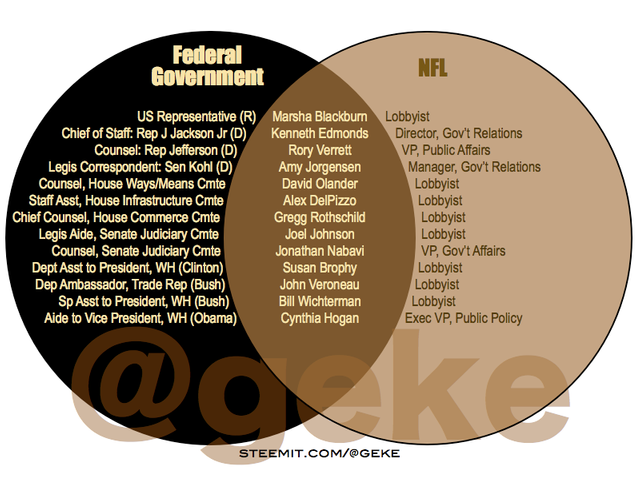
Yesterday the Supreme Court of the United States found a federal law banning sports betting to be unconstitutional. In 2012, New Jersey Governor Christie attempted something similar, legalizing sports gambling in his state, but the NFL along with other sports leagues filed a lawsuit to oppose it. Responding to yesterday's Supreme Court decision, the NFL released a statement calling for a “core regulatory framework” of sports betting.
Put that issue in the loss column, but the NFL is a powerhouse of Washington influence and usually wins its battles by nurturing tight relationships with the federal government. And those relationships bridge successive administrations. It's well known that seven NFL owners each donated $1 million to Trump's inaugural committee:
- Dan Snyder (Washington Redskins)
- Shad Khan (Jacksonville Jaguars)
- Bob McNair (Houston Texans)
- Robert Kraft (New England Patriots)
- Woody Johnson (New York Jets)
- Stan Kroenke (Los Angeles Rams)
But five NFL owners also donated to Obama's campaign in 2008, including the Atlanta Falcons owner, Arthur Blank. Each administration enjoys ties to the NFL.
The mainstream media has lately been highlighting tensions between the NFL and the Trump administration, but most of these tensions are superficial. One need only look back to the kneeling controversy started by Colin Kaepernick's protest of the national anthem before games. The controversy ended up pitting President Trump against the NFL, and Trump won. Kaepernick, on the other hand, is out of a job.
Why did the NFL give in to Trump's patriotic pressure? It had a lot to do with the millions the NFL received from the Defense Department for pre-game advertising and enlistment campaigns including military flyovers, color guard ceremonies, and – wait for it – performances of the national anthem.
The McCain-Flake report of 2015 detailed that the Hometown Hero Tributes at Jets and Patriots games were bought and paid for by taxpayers as a way to promote military enlistment. In 2016, the NFL refunded $724,000 of the Defense Department payouts, though it was a small percentage of the millions it received over the last decade.
This isn't the only funneling of taxpayer money to the NFL. Studies are somewhat conflicted, but estimates are that NFL stadiums have received somewhere between $3 and $7 billion of taxpayer money. The NFL often uses tax-exempt municipal bonds to fund stadium construction thanks to a loophole in the US tax code. Two bills were introduced last year in Congress to stop federal funding of sports teams, so we'll see.
The push to end the NFL's tax-exempt status was successful in 2015 when the organization voluntarily gave up existing as a non-profit. But how did the NFL become a non-profit in the first place? In 1966, the league was allowed to sneak a benny into the tax code: Section 501(c)6 of 26 U.S.C. had originally given non-profit status to “business leagues, chambers of commerce, real-estate boards, or boards of trade.” The 1966 revision of the Sports Broadcasting Act added “or professional football leagues.”
As payback for the help the NFL received by Louisiana Senator Russell Long and Louisiana Representative Hale Boggs, the next NFL expansion franchise was given to New Orleans.
But why did the NFL choose to give up this hard-fought-for status? Most likely because once the NFL was no longer a non-profit, it no longer had to disclose Commissioner Roger Goodell's salary.
Note a Shadow Tie not included on the venn: the father of Hope Hicks, Trump's press secretary, counts the NFL as a client of his public relations and communications company.


Curated for #informationwar (by @wakeupnd)
Relevance: Sharing the truth.
Downvoting a post can decrease pending rewards and make it less visible. Common reasons:
Submit
Government has no business being in the sports business anyway. It's like they create a monopoly so they can hand it more pork and get more campaign contributions.
Downvoting a post can decrease pending rewards and make it less visible. Common reasons:
Submit